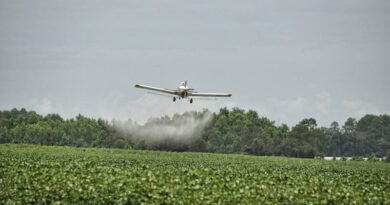Farmers, Conservationists Ask Court to Strike Down Crop-Damaging Dicamba Pesticide
17 April 2023, Arizona: Four public-interest organizations representing farmers and conservationists filed arguments seeking to have a federal court again strike down the Environmental Protection Agency’s controversial approval of the drift-prone, volatile herbicide dicamba.
The arguments, filed late Tuesday, are a continuation of an earlier lawsuit that resulted in a 2020 court ruling overturning prior approvals of dicamba as unlawful. The new litigation was prompted by the EPA’s decision to ignore the court’s ruling and move forward with reapproving the pesticide.
In reapproving dicamba the EPA once again failed to weigh the true costs to farmers and the environment, instead relying on use instructions that researchers have found to be virtually impossible to follow in real-world farming conditions, according to the groups.
“We now have years of incontrovertible evidence revealing that these dicamba products cannot be used without causing grave harm to other farmers and the environment,” said George Kimbrell, CFS legal director and counsel in the case. “It’s déjà vu all over again: We are asking the court to nullify EPA’s unlawful approval.”
In 2016 Monsanto opened the floodgates to massive spraying of dicamba during farming season by genetically engineering soybeans and cotton to withstand “over-the-top” spraying of the pesticide. The results have been devastating, annually causing millions of acres of off-field pesticide drift as never before seen in the history of U.S. agriculture.
Millions of acres of farmers’ crops have been “damaged and sometimes destroyed by dicamba spray droplets drifting off-field during application,” according to the groups’ filing. This includes dicamba “vapor clouds damaging vast fields from fencerow to fencerow; dicamba-laced water running off sprayed fields; and even dicamba-contaminated rainfall in areas of intensive use.”
Dicamba drift and runoff also damage natural areas and wildlife refuges, injuring wild flowering plants, including some federally protected species, on which bees and other insects rely.
“The EPA has turned a blind eye to dicamba’s damage to beautiful, endangered plants like whorled sunflowers that are hanging on the edge of survival,” said Stephanie Parent, a senior attorney at the Center for Biological Diversity and co-counsel in the case. “Many imperiled pollinators, like endangered rusty-patched bumblebees, are also being harmed by indiscriminate use of dicamba.”
Despite the EPA’s claims that the changes in use guidelines included in the 2020 approval of the pesticide would halt drift harm, in December 2021 the agency released a damning report admitting continued widespread dicamba damage and potential harms to federally protected species. At least 63 counties with endangered species experienced damage from dicamba drift. Yet in December 2021, even after that documented harm, the EPA refused to cancel dicamba registration.
The pesticide industry encouraged widespread use of the older, more toxic dicamba after over-the-top use of the glyphosate-based product Roundup on crops genetically altered to resist it fueled an epidemic of weed resistance across 120 million acres.
“Since the approval of dicamba for over-the-top use on soybeans in 2016, our farm has seen consistent and significant damage to a wide range of vegetable crops,” said Robert Faux, farmer and communications manager at Pesticide Action Network, a plaintiff in the case. “Victims of drift have little recourse as the volatilized chemical cannot be readily tracked to the source and movement can still happen even when the application is done according to label specifications. Dicamba removes vital options for farmers, taking away opportunities to grow specialty crops or select seed that is not dicamba-ready.”
“Many farmers feel that they have no choice but to plant dicamba-resistant soy and cotton defensively, in order to avoid economic losses from waves of drift damage,” said Lisa Griffith of National Family Farm Coalition, another plaintiff in the case.
The plaintiffs are National Family Farm Coalition, Pesticide Action Network, Center for Food Safety, and the Center for Biological Diversity, represented by legal counsel from the Center for Food Safety and the Center for Biological Diversity.
Also Read: Tractor sale in India crosses 8 lakh mark
(For Latest Agriculture News & Updates, follow Krishak Jagat on Google News)















